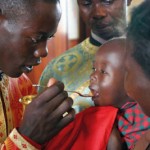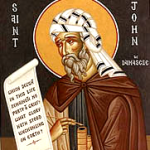by St. John of Damascus
 The bread and the wine are not merely figures of the body and blood of Christ (God forbid!) but the deified body of the Lord itself: for the Lord has said,
The bread and the wine are not merely figures of the body and blood of Christ (God forbid!) but the deified body of the Lord itself: for the Lord has said,
“This is My body,”
not, this is a figure of My body: and
“My blood,”
not, a figure of My blood. And on a previous occasion He had said to the Jews, Except you eat the flesh of the Son of Man and drink His blood, you have no life in you. For My flesh is meat indeed and My blood is drink indeed. And again, He that eats Me, shall live (John 6:51-55).
Wherefore with all fear and a pure conscience and certain faith let us draw near and it will assuredly be to us as we believe, doubting nothing. Let us pay homage to it in all purity both of soul and body: for it is twofold. Let us draw near to it with an ardent desire, and with our hands held in the form of the cross let us receive the body of the Crucified One: and let us apply our eyes and lips and brows and partake of the divine coal, in order that the fire of the longing, that is in us, with the additional heat derived from the coal may utterly consume our sins and illumine our hearts, and that we may be inflamed and deified by the participation in the divine fire. Isaiah saw the coal. (Isaiah 6:6)
 But coal is not plain wood but wood united with fire: in like manner also the bread of the communion is not plain bread but bread united with divinity. But a body which is united with divinity is not one nature, but has one nature belonging to the body and another belonging to the divinity that is united to it, so that the compound is not one nature but two.
But coal is not plain wood but wood united with fire: in like manner also the bread of the communion is not plain bread but bread united with divinity. But a body which is united with divinity is not one nature, but has one nature belonging to the body and another belonging to the divinity that is united to it, so that the compound is not one nature but two.
With bread and wine Melchisedek, the priest of the most high God, received Abraham on his return from the slaughter of the Gentiles. (Genesis 14:18) That table pre-imaged this mystical table, just as that priest was a type and image of Christ, the true high-priest. (Leviticus 14) For you are a priest for ever after the order of Melchisedek. Of this bread the show-bread was an image. This surely is that pure and bloodless sacrifice which the Lord through the prophet said is offered to Him from the rising to the setting of the sun (Malachi 1:11) .
The body and blood of Christ are making for the support of our soul and body, without being consumed or suffering corruption, not making for the draught (God forbid!) but for our being and preservation, a protection against all kinds of injury, a purging from all uncleanness: should one receive base gold, they purify it by the critical burning lest in the future we be condemned with this world. They purify from diseases and all kinds of calamities; according to the words of the divine Apostle (1 Corinthians 11:31-32), For if we would judge ourselves, we should not be judged. But when we are judged, we are chastened of the Lord, that we should not be condemned with the world. This too is what he says, So that he that partakes of the body and blood of Christ unworthily, eats and drinks damnation to himself. Being purified by this, we are united to the body of Christ and to His Spirit and become the body of Christ.
This bread is the first-fruits of the future bread which is epiousios, i.e. necessary for existence. For the word epiousios signifies either the future, that is Him Who is for a future age, or else Him of Whom we partake for the preservation of our essence. Whether then it is in this sense or that, it is fitting to speak so of the Lord’s body. For the Lord’s flesh is life-giving spirit because it was conceived of the life-giving Spirit. For what is born of the Spirit is spirit. But I do not say this to take away the nature of the body, but I wish to make clear its life-giving and divine power (John 6:63) .
But if some persons called the bread and the wine antitypes of the body and blood of the Lord, as did the divinely inspired Basil, they said so not after the consecration but before the consecration, so calling the offering itself.
Participation is spoken of; for through it we partake of the divinity of Jesus. Communion, too, is spoken of, and it is an actual communion, because through it we have communion with Christ and share in His flesh and His divinity: yea, we have communion and are united with one another through it. For since we partake of one bread, we all become one body of Christ and one blood, and members one of another, being of one body with Christ.
With all our strength, therefore, let us beware lest we receive communion from or grant it to heretics; Give not that which is holy unto the dogs, says the Lord, neither cast ye your pearls before swine (Matthew 7:6), lest we become partakers in their dishonour and condemnation. For if union is in truth with Christ and with one another, we are assuredly voluntarily united also with all those who partake with us. For this union is effected voluntarily and not against our inclination. For we are all one body because we partake of the one bread, as the divine Apostle says (1 Corinthians 10:17) .
The Fount of Knowledge 3.4
